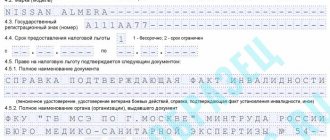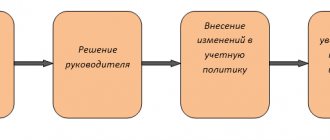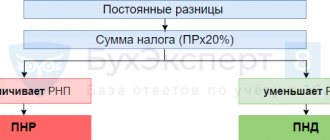General information about corporate property tax
The legal basis for levying property tax on organizations is Chapter. 30 of the Tax Code of the Russian Federation and local legislative acts, since this tax is regional. Organizational property tax must be paid by firms on special tax purposes, and on some property - by special regime officers and individual entrepreneurs. Officials at the federal and regional levels may grant some organizations full or partial exemption from corporate property taxes. For example, companies involved in preparations for the 2022 FIFA World Cup (to be held in Russia) do not pay property tax.
Find out who does not pay property tax from the publication .
The tax base for corporate property tax is calculated based on data on the average annual value of the company's movable and immovable property. In this case, the average value of the property is calculated based on the residual value of the accounting objects, that is, the depreciation value is subtracted from the original cost of the property.
For an example of calculating property tax based on its average annual value, see here.
For a number of objects, the tax base can be calculated based on cadastral valuation data.
Step-by-step instructions for calculating the “cadastral” property tax are available at the link.
IMPORTANT! If property is valued at its average annual value, then the tax rate on it cannot be higher than 2.2%. But regional authorities have the right to set their own tax rate below this figure, and it may differ for different categories of property. For objects taxed at cadastral value, the maximum tax rate is 2%. And for strategic objects, for example gas pipelines and gas production facilities, the tax rate is completely zero.
Find out how the property tax rate has changed in recent years from the material.
Payers must report on corporate property tax quarterly - by calculating and transferring advance payments (if they are provided for by regional acts). Once a year, companies submit a property tax return. Regional authorities have the right to change the deadlines for making advance payments and submitting reports. For example, in a constituent entity of the Russian Federation it may be allowed not to pay advances on taxes, but to pay the budget once a year - based on the results of the tax period.
We will tell you in this article who, when and how to pay advances on property taxes.
In addition to other relaxations of the tax burden on the property tax of organizations, regional officials can create a list of benefit organizations or preferential property.
Find out about property tax benefits here.
And also from publications:
- “How to use property tax benefits for energy-efficient real estate?”;
- “Railroads received property tax relief”;
- “Transformation of a joint-stock company into a public joint-stock company: what will happen to the property tax benefit?”.
Over the past 3 years, corporate property tax has become perhaps the most discussed tax. In 2014, legislators decided to levy taxes on a number of objects based on cadastral value. Moreover, those companies that were previously exempt from paying property tax were also obliged to pay it: in 2014, this right was taken away from UTII payers, and since 2015, simplified workers also pay property tax. Of course, this is possible provided that the regional authorities have compiled a list of cadastral real estate and issued an order to levy a tax on such property, indicating the size of the rates.
The article “Property Tax: Changes 2016” will tell you about what changes in the calculation of property tax 2016 brought us.
The 2022 innovations in property tax are presented in the material.
Rates for different tax objects
The basic tax rate for a Russian organization is 20%, which is distributed among budgets in 2022 - 2022 as follows:
3% – to the Federal Budget
17% – to the Regional budget
Rates for some other types of income are shown in Table 1
Table 1
| Type of income | Bid | |
| Federal budget | Regional budget | |
| Profit of agricultural producers, educational and medical organizations | 0 | 0 |
| Income in the form of interest on municipal securities issued (for a period of at least 3 years) before January 1, 2007 | 9 | 0 |
| Profit from rental (subleasing) of ships and aircraft | 10 | 0 |
| Profit of free economic zone organizations | 0 | 12,5 |
| Dividends on shares of a Russian company | 13 | 0 |
| Dividends received by foreign companies on shares of Russian organizations | 15 | 0 |
| Income from the use of rights to intellectual property of a foreign company | 20 | 0 |
| Income from securities (except dividends) recorded in the securities accounts of a foreign company | 30 | 0 |
Object of taxation for corporate property tax
The object of taxation for corporate property tax is determined by Art. 374 Tax Code of the Russian Federation. According to the law, it is considered to be movable and immovable property, which is taken into account on the balance sheet of the taxpayer as a fixed asset.
IMPORTANT! Property tax must also be paid on property that the company has transferred for temporary use, trust management, or contributed to joint activities. The only nuance is who pays this tax.
For foreign organizations that operate through permanent representative offices, the object of taxation is the property that they received under a concession agreement. If a foreign company does not have a permanent representative office, then the tax is imposed on property located on the territory of the Russian Federation and owned by a foreign company, as well as property received under a concession agreement.
What cannot be subject to property tax? Land plots and other natural objects (lakes, forests), cultural heritage sites, nuclear installations, icebreakers, space objects, property of some federal bodies. Also, fixed assets belonging to depreciation groups 1 and 2 are not subject to tax. An example is an expensive printer for accounting needs.
Real estate in this case is something that cannot be moved: buildings, structures, objects of unfinished construction. Real estate transactions are subject to mandatory registration in the Unified State Register of Rights to Real Estate and Transactions with It. Movable property for property tax purposes - equipment, machines, automobile and cargo transport.
IMPORTANT! The legislation of different countries may classify the same object as real estate in one state, and as movable property in another. In such cases, the norm of the Civil Code (Article 1205) applies, according to which the belonging of an object to a certain type of property is determined according to the laws of the country where the object is actually located.
In the material “St. 374 of the Tax Code of the Russian Federation (2017): questions and answers,” our specialists have collected the most frequently asked questions regarding the determination of the object of property taxation and prepared detailed answers to them, taking into account the latest changes in legislation, letters from the Ministry of Finance, the Federal Tax Service and arbitration practice.
Commentary to Art. 374 Tax Code of the Russian Federation
Objects of property taxation for Russian and foreign organizations have their own characteristics, so we will consider them separately.
Object of taxation for Russian organizations
In accordance with paragraph 1 of Article 374 of the Tax Code of the Russian Federation, the object of taxation for Russian organizations is movable and immovable property recorded on the balance sheet as fixed assets in accordance with the established accounting procedure.
Based on this definition, property subject to taxation must simultaneously have the following two characteristics:
- the property must be movable or immovable;
— property must be recognized as an object of fixed assets in accordance with the accounting rules.
The concepts of movable and immovable property are given in Article 130 of the Civil Code of the Russian Federation. Thus, real estate includes land plots, subsoil plots, isolated water bodies and everything that is firmly connected to the land, that is, objects whose movement without disproportionate damage to their purpose is impossible, including forests, perennial plantings, buildings, structures.
Immovable property also includes aircraft and sea vessels, inland navigation vessels, and space objects subject to state registration. The law may classify other property as immovable property.
Movable property includes things that are not real property, including money and securities.
From these definitions it turns out that any property of an organization can be subject to taxation. Therefore, in this case, the second condition acquires decisive importance when forming a taxable object - property must be recognized as an object of fixed assets, in accordance with the rules of accounting.
In other words, if any property is not recognized as an object of fixed assets according to accounting rules, then it is not subject to taxation. An exception to this rule concerns special cases provided for in Chapter 30 of the Tax Code of the Russian Federation. In particular, this is provided for property accounted for under a simple partnership agreement (joint activity agreement) (Article 377 of the Tax Code of the Russian Federation), as well as property transferred to trust management (Article 378 of the Tax Code of the Russian Federation). The specifics of determining the object of taxation within the framework of these operations, as well as when renting property, will be discussed later.
The procedure for maintaining accounting records of fixed assets is regulated by Federal Law dated November 21, 1996 N 129-FZ “On Accounting”, Accounting Regulations “Accounting for Fixed Assets” PBU 6/01 (approved by Order of the Ministry of Finance of the Russian Federation dated March 30, 2001 N 26n), as well as Methodological guidelines for accounting of fixed assets (approved by Order of the Ministry of Finance of the Russian Federation of October 13, 2003 N 91n).
In accordance with paragraph 4 of PBU 6/01, when accepting assets for accounting as fixed assets, the following conditions must be simultaneously met:
- the object is intended for use in the production of products, when performing work or providing services, for the management needs of the organization, or for provision by the organization for a fee for temporary possession and use or for temporary use;
- use for a long time, i.e. useful life exceeding 12 months or normal operating cycle if it exceeds 12 months;
— the organization does not intend to subsequently resell these assets;
— the ability to bring economic benefits (income) to the organization in the future.
In the absence of at least one of these signs, the property does not belong to fixed assets.
For example, fixed assets include: buildings, structures, working and power machines and equipment, measuring and control instruments and devices, computer technology, vehicles, tools, production and household equipment and accessories, working, productive and breeding livestock, perennial plantings, on-farm roads and other relevant facilities.
The objects specified in paragraph 3 of PBU 6/01 are not taken into account as part of fixed assets. These are machines, equipment and other similar items listed as finished products in the warehouses of manufacturing organizations, and as goods - in the warehouses of organizations engaged in trading activities. In addition, items handed over for installation or to be installed, those in transit, as well as capital and financial investments are not considered fixed assets.
I would like to note that vehicles, which, at the same time, are also an independent object of taxation for transport tax, fully fall under the definition of an object for property tax.
This situation may lead to the idea that the legislator has violated the principle of one-time taxation arising from Article 3 of the Tax Code of the Russian Federation. This issue was the subject of consideration by the Constitutional Court of the Russian Federation.
Thus, in the Determination of December 14, 2004 N 451-O, the Constitutional Court of the Russian Federation o. Thus, as the Constitutional Court of the Russian Federation indicated, double taxation is not carried out in this case.
A difficult issue is the taxation of fixed assets recorded in account 03 “Income-generating investments in tangible assets”.
Before January 1, 2006, the Russian Ministry of Finance repeatedly emphasized that, in accordance with the requirements of regulatory documents on accounting, in the event of initial acceptance for accounting of property objects intended not for use in the production of products, performance of work, provision of services by the organization, but for provision for a fee for a temporary use (temporary possession and use) for the purpose of generating income, these objects are recognized as profitable investments in material assets. Such assets are not fixed assets (qualitatively different from non-current assets accounted by the organization as fixed assets) (see letter of the Ministry of Finance of Russia dated November 19, 2004 N 03-06-01-04/139).
Since, according to paragraph 1 of Article 374 of the Tax Code of the Russian Federation, the object of taxation for property tax is movable and immovable property recorded on the balance sheet as fixed assets, the financial department (and after it the tax authorities) constantly explained that assets accounted for by the organization on account 03 “Profitable investments in material assets”, are not subject to property tax (see letters of the Ministry of Finance of Russia dated June 22, 2005 N 07-05-06/181, Federal Tax Service of Russia dated May 19, 2005 N GV-6-21 / [email protected] ).
From January 1, 2006, paragraph 2 of PBU 6/01 was excluded, which provided that the standard establishing the rules for accounting for fixed assets also applies to profitable investments in tangible assets. This exception is due to the revision of paragraph 4 of PBU 6/01, which defines the criteria for accepting an asset for accounting as fixed assets. In accordance with the new edition, the first such criterion is not only the purpose of the object for use in the production of products, when performing work or providing services, or for the management needs of the organization, but also for provision by the organization for a fee for temporary possession and use or for temporary use.
At the same time, the procedure for reflecting assets classified as fixed assets in accounting accounts remains the same as before January 1, 2006:
— assets intended for use in production activities (in the provision of services, performance of work, for management needs) are accepted for accounting in account 01 “Fixed Assets”;
— assets intended to be provided for a fee for temporary possession and use or for temporary use are accepted for accounting in account 03 “Income-generating investments in material assets.”
It’s just that from January 1, 2006, fixed assets are recognized not only as assets accounted for in account 01, but also for assets accounted for in account 03. And the inclusion of property reflected in account 03 in fixed assets automatically includes it in the tax base for taxes on the property of organizations.
Thus, a seemingly small amendment led to the fact that from January 1, 2006, the property recorded in account 03 became subject to property tax. The Ministry of Finance of Russia also points to this in a letter dated February 8, 2006 N 03-06-01-04/11.
Object of taxation of foreign organizations
In accordance with paragraph 2 of Article 374 of the Tax Code of the Russian Federation, the object of taxation for foreign organizations operating in the Russian Federation through permanent representative offices is movable and immovable property related to fixed assets.
At the same time, for the purposes of calculating property tax, foreign organizations keep records of taxable items in accordance with the accounting procedure established in the Russian Federation.
Consequently, the basic rules for accounting for fixed assets discussed above must be applied by foreign organizations operating on the territory of the Russian Federation through permanent representative offices.
The object of taxation for foreign organizations that do not carry out activities in the Russian Federation through permanent representative offices is recognized as real estate located on the territory of the Russian Federation, owned by these foreign organizations by right of ownership (clause 3 of Article 374 of the Tax Code of the Russian Federation).
In accordance with paragraph 4 of Article 374 of the Tax Code of the Russian Federation, the following are not recognized as objects of taxation:
1) land plots and other environmental management facilities (water bodies and other natural resources);
2) property owned by the right of economic management or operational management to federal executive authorities, in which military and (or) equivalent service is legally provided for, used by these authorities for the needs of defense, civil defense, security and law enforcement in the Russian Federation.
The first exception applies to all taxpayers (both Russian and foreign organizations). It is due to the fact that the use of land and natural resources is associated with the need to pay other tax payments:
— water tax;
— mineral extraction tax;
- land tax.
The second exception applies only to the relevant federal executive authorities. And this is provided that these bodies legally provide for military and (or) service equivalent to it, and the property is used for the needs of defense, civil defense, security and law enforcement in the Russian Federation.
Military service includes service in the Armed Forces of the Russian Federation, as well as in the border troops, in the internal troops of the Ministry of Internal Affairs of Russia, in the Railway Troops of the Russian Federation, civil defense troops (other troops), engineering, technical and road construction military formations under federal executive authorities ( military formations), the Foreign Intelligence Service of the Russian Federation, federal security service agencies, federal special communications and information agency, federal state security agencies, federal agency for ensuring mobilization training of government bodies of the Russian Federation (bodies), military units of the State Fire Service of the Ministry of the Russian Federation for Civil Defense , emergency situations and liquidation of consequences of natural disasters and special formations created for wartime. This is stated in Article 2 of the Federal Law of March 28, 1998 N 53-FZ “On Military Duty and Military Service”.
In addition, according to Article 8 of this Law, service in the internal affairs bodies (including the migration service), the State Fire Service of the Ministry of the Russian Federation for Civil Defense, Emergency Situations and Disaster Relief, institutions and bodies of the penal system is equivalent to military service. and authorities for control over the circulation of narcotic drugs and psychotropic substances.
Other property of the specified federal executive bodies is subject to corporate property tax in the generally established manner. For the purpose of calculating and paying this tax, federal executive authorities are required to keep separate records of taxable and non-taxable fixed assets.
It should be borne in mind that institutions (laboratories, research institutions, computer centers, other organizations and unitary enterprises) that are part of the above bodies pay corporate property tax in the generally established manner.
Features of paying tax on movable property
An organization can recognize as movable property those fixed assets that are mobile, that is, they can be moved, for example: a dough sheeter, printing equipment, a packaging machine, an enterprise car. Money and securities are also movable property of an enterprise, but they do not satisfy another criterion for classifying property as an object of taxation - property must be accounted for as a fixed asset in accordance with PBU 6/01. The taxation of “movables” has undergone a number of changes in recent years. In 2013–2014, there was a rule according to which movable property items accepted for accounting on account 01 were not subject to taxation. However, since 2015, officials have revised the tax collection procedure.
How you now need to pay tax on movable property and what tax relief is provided for companies, read in this publication.
For the latest news on movable property benefits, click here.
In 2014-2015, many companies carried out a reorganization procedure: amendments to the Civil Code of the Russian Federation led to the removal of the concepts of “closed joint-stock company” and “open joint-stock company” from the legislation. OJSC and CJSC were re-registered as LLC, JSC or PJSC. Does a change of name affect the obligation to pay movable property tax?
You will find the answer in this article.
Many questions arise for accountants and lawyers with movable property that was collected from materials purchased from a dependent party (for example, from a company whose authorized capital consists of more than 25% of your company's share).
In what cases does interdependence affect the calculation of property tax, and when not - read the materials:
- “When Interdependence Matters for Property Taxes”;
- “The movable property came from an interdependent commission agent—is there a right to a “property” benefit?”;
- “Installation of OS by a related party will not deprive property tax benefits.”
Our website specialists have prepared a number of publications for you that will help clarify the accounting of interdependent “movables”. For example, personal property is built from materials you purchased from a dependent party. Should I pay property tax?
The answer is here.
The site’s experts will tell you in this publication whether an enterprise can count on benefits for property from depreciation groups 1 and 2, but collected from the materials of a related party.
Legislators are constantly changing the procedure for imposing property tax on movable objects, so we advise you to regularly check the current regulations. And our site is always ready to help you with this.
Object of taxation of foreign companies
Foreign companies are divided into:
- companies operating in Russia through permanent representative offices
- other foreign companies. Other foreign companies do not engage in business activities on the territory of Russia, but receive other types of income specified in Article 309 of the Tax Code of the Russian Federation.
For the former, the object of taxation will be income received through permanent representative offices, reduced by expenses incurred by such representative offices.
For the second - income received from sources in the Russian Federation.
Such income includes:
- Dividends paid to a foreign company if such company is a shareholder or participant in a Russian company.
- Income of a foreign company in the event of distribution in its favor of profits or property of a Russian company or company associations, including during their liquidation.
- Income in the form of interest on debt obligations. Such obligations may be state and municipal issue-grade securities and other debt obligations.
- Income from the use of rights to intellectual property. For example, payments for the use of copyright for literary works, films, patents, trademarks.
- Income from the sale of shares (shares) of organizations, more than 50% of whose assets consist of real estate.
- Income from the sale and rental of property located in Russia.
- Income from international transportation.
- Other income listed in Article 309 of the Tax Code of the Russian Federation.
Tax on such income is withheld by the source of payment - the Russian company (tax agent).





